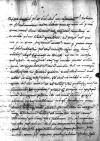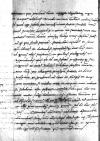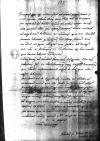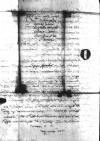Non dubito, quin ex animo mihi Paternitas Vestra Reverendissima novum hunc honorem atque magistratum cancellarii a Sigismund I Jagiellon (Zygmunt I) (*1467 – †1548), King of Poland and Grand Duke of Lithuania (1506-1548); Duke of Głogów (Glogau) (1499-1506), Duke of Opava (1501-1506), Governor of Silesia (1504-1506); son of King Kazimierz IV Jagiellon and Elisabeth of Austria⌊regia maiestateSigismund I Jagiellon (Zygmunt I) (*1467 – †1548), King of Poland and Grand Duke of Lithuania (1506-1548); Duke of Głogów (Glogau) (1499-1506), Duke of Opava (1501-1506), Governor of Silesia (1504-1506); son of King Kazimierz IV Jagiellon and Elisabeth of Austria⌋ ad me delatum cf. [Ioannes DANTISCUS] to [Jan CHOJEŃSKI] Löbau (Lubawa), 1537-03-16, CIDTC IDL 1594⌊gratuleturcf. [Ioannes DANTISCUS] to [Jan CHOJEŃSKI] Löbau (Lubawa), 1537-03-16, CIDTC IDL 1594⌋, tum propter eum, quo me Paternitas Vestra Reverendissima prosequitur amore, tum quod putat Roman Catholic Church ⌊reipublicae non solum ecclesiasticaeRoman Catholic Church ⌋, sed etiam universae Poland (Kingdom of Poland, Polonia)⌊RegniPoland (Kingdom of Poland, Polonia)⌋ atque bonis omnibus aliquid dignitatis et commodi ex ea re accessurum esse. Quicquid vero eius rei accidit, praeter omnem spem et exspectationem meam accidit. Nam ut neutiquam ambivi, ita ne speravi quidem, cum illud unum meditabar in eoque totus eram, quod etiam non celabam a Vestra Paternitate Reverendissima, dum Cracow (Kraków, Cracovia), city in southern Poland, Małopolska, on the Vistula river, from 1038 capital of the Kingdom of Poland⌊hicCracow (Kraków, Cracovia), city in southern Poland, Małopolska, on the Vistula river, from 1038 capital of the Kingdom of Poland⌋ erat, ut ab aulicis istis publicisque curis et functionibusque expeditus primo quoque tempore ad episcopam meam demigrare possem et ut curam dominici gregis pascendi praesens incumberem. Sed cum sic Divinae Providentiae Sigismund I Jagiellon (Zygmunt I) (*1467 – †1548), King of Poland and Grand Duke of Lithuania (1506-1548); Duke of Głogów (Glogau) (1499-1506), Duke of Opava (1501-1506), Governor of Silesia (1504-1506); son of King Kazimierz IV Jagiellon and Elisabeth of Austria⌊regiaeque maiestatiSigismund I Jagiellon (Zygmunt I) (*1467 – †1548), King of Poland and Grand Duke of Lithuania (1506-1548); Duke of Głogów (Glogau) (1499-1506), Duke of Opava (1501-1506), Governor of Silesia (1504-1506); son of King Kazimierz IV Jagiellon and Elisabeth of Austria⌋ placitum est, non fuit mihi integrum neque consentaneum humeros ab imposito onere, onus enim verius quam honos est, subducere. Cui cum imparem me esse sciam, quin ut illud pro temporum et personarum, quales hoc saeculum gignit, ratione bene ferre possim, peto a Vestra Reverendissima Paternitate, ut me precibus ad Deum assidue fusis  AAWO, AB, D. 68, f. 121v adiuvet, quo provinciam hanc ex usu dignitateque regia et reipublicae cumprimis, deinde in rem ecclesiastici ordinis, admi(ni)strem hidden by binding⌈[strem]strem hidden by binding⌉. Id quod ego sedulo pro virili mea facere studebo. Verum, quod peramice hortatur Paternitas Vestra Revrerendissima, ut sanitatis meae accuratiorem rationem habueram onusque humeris meis impositum simul cum iis, qui ferant, partiam, facio hoc equidem, et sane quam libenter, in dictandis exarandisque aut litteris, aut id genus aliis scripturis, in quibus perlegendis et expendendis opus est, tum ut sedatum perspicaxque sit ingenium, et rectum iudicium, sed haec forsan minora aut nihili prae illisque, priusquam fiant, et bene prospicere, et prudenter, cum bono et principis, et reipublicae, aut avertere, si mala aut et noxia, aut inducere, si salubria esse possent, necesse h(ab)et, qui hoc munere recte fungi voluerit. Sunt praeterea innumera, quae ad conficiendas vires non corporis tantum, sed animi etiam tam valent, ut nullis pene remediis sanari quaeant, sed de hoc plus satis.
AAWO, AB, D. 68, f. 121v adiuvet, quo provinciam hanc ex usu dignitateque regia et reipublicae cumprimis, deinde in rem ecclesiastici ordinis, admi(ni)strem hidden by binding⌈[strem]strem hidden by binding⌉. Id quod ego sedulo pro virili mea facere studebo. Verum, quod peramice hortatur Paternitas Vestra Revrerendissima, ut sanitatis meae accuratiorem rationem habueram onusque humeris meis impositum simul cum iis, qui ferant, partiam, facio hoc equidem, et sane quam libenter, in dictandis exarandisque aut litteris, aut id genus aliis scripturis, in quibus perlegendis et expendendis opus est, tum ut sedatum perspicaxque sit ingenium, et rectum iudicium, sed haec forsan minora aut nihili prae illisque, priusquam fiant, et bene prospicere, et prudenter, cum bono et principis, et reipublicae, aut avertere, si mala aut et noxia, aut inducere, si salubria esse possent, necesse h(ab)et, qui hoc munere recte fungi voluerit. Sunt praeterea innumera, quae ad conficiendas vires non corporis tantum, sed animi etiam tam valent, ut nullis pene remediis sanari quaeant, sed de hoc plus satis.
Vanitas nuntiorum Nobility of Royal Prussia ⌊nobilitatisNobility of Royal Prussia ⌋ con{p}temnenda non videtur neque enim illis aliquid datum est ex thesauro regio aut aliunde. Quod datum est Paternitati Vestrae Reverendissimae, certe ego non prius accepi, quam ex cf. [Ioannes DANTISCUS] to [Jan CHOJEŃSKI] Löbau (Lubawa), 1537-03-16, CIDTC IDL 1594⌊litteriscf. [Ioannes DANTISCUS] to [Jan CHOJEŃSKI] Löbau (Lubawa), 1537-03-16, CIDTC IDL 1594⌋ eius.
 AAWO, AB, D. 68, f. 122r
AAWO, AB, D. 68, f. 122r
Tempus, quo ego venturus sum ad episcopatum meum, sciat Paternitas Vestra Reverendissima secundam Maii aut circa, nam eo tempore fit capitulum, quod dicunt generale in ecclesia mea, et iam tandem quiescam illic per aestatis tempus, donec revertitur ab expeditione bellica Sigismund I Jagiellon (Zygmunt I) (*1467 – †1548), King of Poland and Grand Duke of Lithuania (1506-1548); Duke of Głogów (Glogau) (1499-1506), Duke of Opava (1501-1506), Governor of Silesia (1504-1506); son of King Kazimierz IV Jagiellon and Elisabeth of Austria⌊regia maiestasSigismund I Jagiellon (Zygmunt I) (*1467 – †1548), King of Poland and Grand Duke of Lithuania (1506-1548); Duke of Głogów (Glogau) (1499-1506), Duke of Opava (1501-1506), Governor of Silesia (1504-1506); son of King Kazimierz IV Jagiellon and Elisabeth of Austria⌋. Sigismund I Jagiellon (Zygmunt I) (*1467 – †1548), King of Poland and Grand Duke of Lithuania (1506-1548); Duke of Głogów (Glogau) (1499-1506), Duke of Opava (1501-1506), Governor of Silesia (1504-1506); son of King Kazimierz IV Jagiellon and Elisabeth of Austria⌊QuaeSigismund I Jagiellon (Zygmunt I) (*1467 – †1548), King of Poland and Grand Duke of Lithuania (1506-1548); Duke of Głogów (Glogau) (1499-1506), Duke of Opava (1501-1506), Governor of Silesia (1504-1506); son of King Kazimierz IV Jagiellon and Elisabeth of Austria⌋ me clementer donavit libertate per exiguum hoc temporis spatium, sed ea ratione, ut postea allegare me posset ad Ferdinand I of Habsburg (*1503 – †1564), from 1521 Archduke of Austria, from 1526 King of Bohemia and Hungary, Croatia and Slavonia as Ferdinand I, 1531-1558 King of the Romans, 1558-1564 Holy Roman Emperor; son of Philip I the Handsome and Joanna the Mad of Castile, a younger brother of Charles V of Habsburg⌊regem RomanorumFerdinand I of Habsburg (*1503 – †1564), from 1521 Archduke of Austria, from 1526 King of Bohemia and Hungary, Croatia and Slavonia as Ferdinand I, 1531-1558 King of the Romans, 1558-1564 Holy Roman Emperor; son of Philip I the Handsome and Joanna the Mad of Castile, a younger brother of Charles V of Habsburg⌋, ubi Andrzej Krzycki (Andreas Cricius) (*1482 – †1537), humanist, neo-Latin poet, diplomat, correspondent of Erasmus of Rotterdam; in 1525 he took part in the negotiations leading to the secularisation of the state of the Teutonic Order; from 1504 Canon of Poznań (from 1511 Scholastic, from 1519 Provost); from 1512 Canon of Cracow, Scholastic of Płock, and secretary to the first wife of Sigismund I Jagiellon, Barbara Zápolya; 1515-1523 royal secretary; 1518-1530 Provost of the Chapter of St. Florian in Cracow; 1522-1525 Bishop of Przemyśl; 1525-1527 Bishop of Poznań; 1527-1535 Bishop of Płock; 1535-1537 Archbishop of Gniezno, Primate of Poland (PSB 15, p.544-549)⌊dominus archiepiscopusAndrzej Krzycki (Andreas Cricius) (*1482 – †1537), humanist, neo-Latin poet, diplomat, correspondent of Erasmus of Rotterdam; in 1525 he took part in the negotiations leading to the secularisation of the state of the Teutonic Order; from 1504 Canon of Poznań (from 1511 Scholastic, from 1519 Provost); from 1512 Canon of Cracow, Scholastic of Płock, and secretary to the first wife of Sigismund I Jagiellon, Barbara Zápolya; 1515-1523 royal secretary; 1518-1530 Provost of the Chapter of St. Florian in Cracow; 1522-1525 Bishop of Przemyśl; 1525-1527 Bishop of Poznań; 1527-1535 Bishop of Płock; 1535-1537 Archbishop of Gniezno, Primate of Poland (PSB 15, p.544-549)⌋ non convaluerit ex hoc morbo, quo denuo laborat non leviter.
Commissarii ad Provincial Diet of Royal Prussia ⌊conventum TorunensemProvincial Diet of Royal Prussia ⌋ designati sunt domini palatini Łukasz Górka (Łukasz of Górka) (*1482 – †1542), 1499-1507 Castellan of Spycimierz; 1507-1511 Castellan of Ląd; 1508-1535 General Starost of Wielkopolska; 1511-1535 Castellan of Poznań; 1535-1537 Voivode of Poznań; 1538 Bishop of Włocławek (PSB 8, p. 409-412)⌊PosnanienisŁukasz Górka (Łukasz of Górka) (*1482 – †1542), 1499-1507 Castellan of Spycimierz; 1507-1511 Castellan of Ląd; 1508-1535 General Starost of Wielkopolska; 1511-1535 Castellan of Poznań; 1535-1537 Voivode of Poznań; 1538 Bishop of Włocławek (PSB 8, p. 409-412)⌋ et Janusz Latalski (†1557), brother of Jan Latalski, Archbishop of Gniezno; 1520-1529 Castellan of Ląd; 1529-1535 Castellan of Gniezno; 1535-1538 Voivode of Inowrocław; 1538-1557 Voivode of Poznań (PSB 16, p. 563; Urzędnicy 1/2, p. 211)⌊VladislaviensisJanusz Latalski (†1557), brother of Jan Latalski, Archbishop of Gniezno; 1520-1529 Castellan of Ląd; 1529-1535 Castellan of Gniezno; 1535-1538 Voivode of Inowrocław; 1538-1557 Voivode of Poznań (PSB 16, p. 563; Urzędnicy 1/2, p. 211)⌋ atque Piotr Służewski (†1550), 1520-1524 castellan of Kowal; 1526-1535 - of Inowrocław; 1535-1538 - of Łęczyca; 1538-1539 - of Kalisz; 1539 voivode of Kalisz; in the spring of 1537 royal commissar and envoy to Prussian diet (PSB 39/2, p. 168-170)⌊castellanus LanciciensisPiotr Służewski (†1550), 1520-1524 castellan of Kowal; 1526-1535 - of Inowrocław; 1535-1538 - of Łęczyca; 1538-1539 - of Kalisz; 1539 voivode of Kalisz; in the spring of 1537 royal commissar and envoy to Prussian diet (PSB 39/2, p. 168-170)⌋, qui habebunt informationem regiam de his, quae illic agere debent.
Mandatum ad dominum Mikołaj Działyński (Nikolaus von Dzialin) (†1545), from 1507 royal courtier; 1510-1528 Chamberlain of Dobrzyń; 1528-1544 Castellan of Kulm (Chełmno); 1544-1545 Voivode of Pomerania; Starosta of Bratian, Strasburg in Preussen (Brodnica), and Dobrzyń (PSB 6, p. 92-94; Urzędnicy 5/2, p. 204)⌊DzyalinskiMikołaj Działyński (Nikolaus von Dzialin) (†1545), from 1507 royal courtier; 1510-1528 Chamberlain of Dobrzyń; 1528-1544 Castellan of Kulm (Chełmno); 1544-1545 Voivode of Pomerania; Starosta of Bratian, Strasburg in Preussen (Brodnica), and Dobrzyń (PSB 6, p. 92-94; Urzędnicy 5/2, p. 204)⌋ mitto cum praesentibus.
Novarum rerum, quae certo scribi possent, nihil habetur.
Auxilium Hans Brask (Ioannes Brask) (*1464 – †1538), The last Catholic bishop of Linköping (1513-1527), doctor of canon law, follower of and advisor to King Gustav Vasa of Sweden. In 1527, after the Diet in Västerås had made the decision to introduce the Reformation in Sweden, Brask went into exile to Poland, where he spent the rest of his life (CHAMARCZUK, passim)
Ioannes Magnus (Ioannes Store, Jöns Månsson, Ioannes Magni) (*1488 – †1544), doctor of theology, diplomat in the service of Pope Adrian VI and Gustav Vasa, King of Sweden. In the years 1526-1531 he was staying in Gdańsk as a royal envoy. After his banishment from Sweden by Protestants, he remained in this city until 1537; in this year he went to Italy, where he took part in the Council of Mantua; 1506 Canon of Linköping and Skara, 1523 Papal Nuncio to the new King of Sweden Gustav Vasa; in the same year Provost of the Strängnäs Chapter and Bishop of Västerås, 1523-1544 Archbishop of Uppsala (consecrated by the Pope in 1533) (MAGNUS 1992, p. 9-11; CE, vol. 2, p. 368)
Magnus Haraldi (Magnus Haraldsson), In 1529 he left Sweden and went to Denmark and then to the Habsburg Netherlands; 1523-1529 Bishop of Skara (the election was not approved by the Pope. In 1529 Haraldi was deposed by the King) (NISBET BAIN, p. 112-113)⌊episcopis exulibusHans Brask (Ioannes Brask) (*1464 – †1538), The last Catholic bishop of Linköping (1513-1527), doctor of canon law, follower of and advisor to King Gustav Vasa of Sweden. In 1527, after the Diet in Västerås had made the decision to introduce the Reformation in Sweden, Brask went into exile to Poland, where he spent the rest of his life (CHAMARCZUK, passim)
Ioannes Magnus (Ioannes Store, Jöns Månsson, Ioannes Magni) (*1488 – †1544), doctor of theology, diplomat in the service of Pope Adrian VI and Gustav Vasa, King of Sweden. In the years 1526-1531 he was staying in Gdańsk as a royal envoy. After his banishment from Sweden by Protestants, he remained in this city until 1537; in this year he went to Italy, where he took part in the Council of Mantua; 1506 Canon of Linköping and Skara, 1523 Papal Nuncio to the new King of Sweden Gustav Vasa; in the same year Provost of the Strängnäs Chapter and Bishop of Västerås, 1523-1544 Archbishop of Uppsala (consecrated by the Pope in 1533) (MAGNUS 1992, p. 9-11; CE, vol. 2, p. 368)
Magnus Haraldi (Magnus Haraldsson), In 1529 he left Sweden and went to Denmark and then to the Habsburg Netherlands; 1523-1529 Bishop of Skara (the election was not approved by the Pope. In 1529 Haraldi was deposed by the King) (NISBET BAIN, p. 112-113)⌋ ego nunc nullum praestare possum, debitis ipse inv hidden by binding⌈[inv]inv hidden by binding⌉olutus et mutuam adhuc ab aliis capiens. Sigismund I Jagiellon (Zygmunt I) (*1467 – †1548), King of Poland and Grand Duke of Lithuania (1506-1548); Duke of Głogów (Glogau) (1499-1506), Duke of Opava (1501-1506), Governor of Silesia (1504-1506); son of King Kazimierz IV Jagiellon and Elisabeth of Austria⌊Regia maiestasSigismund I Jagiellon (Zygmunt I) (*1467 – †1548), King of Poland and Grand Duke of Lithuania (1506-1548); Duke of Głogów (Glogau) (1499-1506), Duke of Opava (1501-1506), Governor of Silesia (1504-1506); son of King Kazimierz IV Jagiellon and Elisabeth of Austria⌋ bellicis impendiis se excusat.
Ad regem iam olim scripsit Bona Sforza (*1494 – †1557), Queen of Poland and Grand Duchess of Lithuania (1518-1557); the second wife of Sigismund I Jagiellon; Duchess of Bari and Rossano; daughter of Gian Galeazzo Sforza of Milan and Isabella of Aragon⌊r(eginalis) maiestasBona Sforza (*1494 – †1557), Queen of Poland and Grand Duchess of Lithuania (1518-1557); the second wife of Sigismund I Jagiellon; Duchess of Bari and Rossano; daughter of Gian Galeazzo Sforza of Milan and Isabella of Aragon⌋, interpellans pro Joachim Rønnow (*1500 – †1542), 1529-1536 Bishop of Roskilde
Knud Henriksen Gyldenstierne (†1560), 1529-1534, 1535-1536 Bishop of Odense
Jørgen Andersen Friis (*ca. 1494 – †1547), 1521-1536 Bishop of Viborg
Stygge Krumpen (*ca. 1485 – †1551), 1533-1536 Bishop of Børglum
Torbern Bille (†1552), 1532-1536 Archbishop of Lund⌊captivis episcopisJoachim Rønnow (*1500 – †1542), 1529-1536 Bishop of Roskilde
Knud Henriksen Gyldenstierne (†1560), 1529-1534, 1535-1536 Bishop of Odense
Jørgen Andersen Friis (*ca. 1494 – †1547), 1521-1536 Bishop of Viborg
Stygge Krumpen (*ca. 1485 – †1551), 1533-1536 Bishop of Børglum
Torbern Bille (†1552), 1532-1536 Archbishop of Lund⌋.
Reverendissimo Mauritius Ferber (*1471 – †1537), doctor of both canon and civil law; from 1507 Canon of Ermland (Warmia) and Lübeck; from 1514 Canon of Trier; 1512-1515 parish priest of the Church of Saints Peter and Paul in Gdańsk (Danzig); from 1516 Custos of Ermland and parish priest of the Church of the Blessed Virgin Mary in Gdańsk; from 1519 Canon of Dorpat; from 1523 Canon of Revel; 1523-1537 Bishop of Ermland (KOPICZKO 2, p. 71-72; SBKW, p. 59-60)⌊domino WarmiensiMauritius Ferber (*1471 – †1537), doctor of both canon and civil law; from 1507 Canon of Ermland (Warmia) and Lübeck; from 1514 Canon of Trier; 1512-1515 parish priest of the Church of Saints Peter and Paul in Gdańsk (Danzig); from 1516 Custos of Ermland and parish priest of the Church of the Blessed Virgin Mary in Gdańsk; from 1519 Canon of Dorpat; from 1523 Canon of Revel; 1523-1537 Bishop of Ermland (KOPICZKO 2, p. 71-72; SBKW, p. 59-60)⌋ egi gratias pro donato equo et dudum misi litteras.
Deus servet incolumem Vestram Reverendissimam Paternitatem.
 AAWO, AB, D. 68, f. 121v adiuvet, quo provinciam hanc ex usu dignitateque regia et reipublicae cumprimis, deinde in rem ecclesiastici ordinis, admi(ni)strem hidden by binding⌈[strem]strem hidden by binding⌉. Id quod ego sedulo pro virili mea facere studebo. Verum, quod peramice hortatur Paternitas Vestra Revrerendissima, ut sanitatis meae accuratiorem rationem habueram onusque humeris meis impositum simul cum iis, qui ferant, partiam, facio hoc equidem, et sane quam libenter, in dictandis exarandisque aut litteris, aut id genus aliis scripturis, in quibus perlegendis et expendendis opus est, tum ut sedatum perspicaxque sit ingenium, et rectum iudicium, sed haec forsan minora aut nihili prae illisque, priusquam fiant, et bene prospicere, et prudenter, cum bono et principis, et reipublicae, aut avertere, si mala aut et noxia, aut inducere, si salubria esse possent, necesse h(ab)et, qui hoc munere recte fungi voluerit. Sunt praeterea innumera, quae ad conficiendas vires non corporis tantum, sed animi etiam tam valent, ut nullis pene remediis sanari quaeant, sed de hoc plus satis.
AAWO, AB, D. 68, f. 121v adiuvet, quo provinciam hanc ex usu dignitateque regia et reipublicae cumprimis, deinde in rem ecclesiastici ordinis, admi(ni)strem hidden by binding⌈[strem]strem hidden by binding⌉. Id quod ego sedulo pro virili mea facere studebo. Verum, quod peramice hortatur Paternitas Vestra Revrerendissima, ut sanitatis meae accuratiorem rationem habueram onusque humeris meis impositum simul cum iis, qui ferant, partiam, facio hoc equidem, et sane quam libenter, in dictandis exarandisque aut litteris, aut id genus aliis scripturis, in quibus perlegendis et expendendis opus est, tum ut sedatum perspicaxque sit ingenium, et rectum iudicium, sed haec forsan minora aut nihili prae illisque, priusquam fiant, et bene prospicere, et prudenter, cum bono et principis, et reipublicae, aut avertere, si mala aut et noxia, aut inducere, si salubria esse possent, necesse h(ab)et, qui hoc munere recte fungi voluerit. Sunt praeterea innumera, quae ad conficiendas vires non corporis tantum, sed animi etiam tam valent, ut nullis pene remediis sanari quaeant, sed de hoc plus satis.


